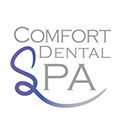Did you know that April is National Facial Protection Month? Almost four million teeth are extracted every year because of facial and dental trauma. Our team at Comfort Dental Spa shares some facts on facial and dental injuries and offers some helpful prevention tips. Dr. Aziza Askari, our talented cosmetic and restorative dentist, treats facial and dental injuries with compassionate, thorough care.
Types of Dental Injuries
Traumatic dental injuries can result in damage to the teeth or gum tissue. Below are a few common types of dental injuries.
- Dislodged Teeth – Blunt force from a fall or accident may push teeth deeper into the tooth socket or loosen the tooth.
- Chipped/Fractured Teeth – This type of injury commonly occurs from biting down on something hard such as an olive pit. Chips may be concealed with dental bonding, porcelain veneers, or restorative dental procedures. In some cases, a piece of the tooth may be reattached. Deep chips or fractures may injure the interior structures of teeth such as the pulp chamber or nerve. Root canal therapy may be necessary to save a tooth from extraction.
- Knocked-Out Teeth – A knocked-out tooth is completely forced out of the tooth socket by facial trauma. Sometimes Dr. Askari can save knocked-out teeth and reattach them with a splint. If the tooth cannot be saved, Comfort Dental Spa addresses tooth loss with dental implants, bridges, and prosthetics.
Facial Injuries
Facial injuries are frequently caused by car wrecks, sports-related injuries, accidents, and acts of violence. Maxillofacial injuries involve damage to the face, mouth, and jawbones. Severe facial trauma affects a patient’s ability to eat, breathe, or speak properly. Addressing facial injuries is a complex and meticulous process. Our team provides maxillofacial and oral surgery procedures in a compassionate and comfortable setting.
Preventing Facial and Dental Injuries
Dr. Askari and our team at Comfort Dental Spa encourage our patients to protect their faces during physical activity—even during non-contact sports. Patients should wear mouthguards, helmets, and faceguards when playing contact sports or engaging in activities with a high incidence of facial injury such as football, hockey, rock climbing, bicycling, or baseball.

 This Summer
This Summer  $1,000 OFF Braces!
$1,000 OFF Braces!